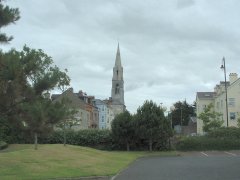Patrick Shea, author of Voices and the Sound of Drums and the only Catholic permanent secretary at Stormont at the outbreak of our Troubles prepared a memorandum for the perusal of ministers and fellow senior civil servants on ‘understanding the relationship between the
Perhaps unsurprisingly, coming from a Catholic from Newry, the memorandum was neither requested nor, as a consequence, offered. Shea reproduced it in his autobiography and we consider it worth reproducing here.
Though we do not accept Shea’s analysis in its totality, it is our opinion that despite all that has happened in the thirty five years since, his words still ring essentially true and powerfully relevant in the twenty-first century.
‘For hundreds of years Irish Protestants were amongst the most privileged people on earth. Constituting a minority in their country they enjoyed power and opportunities far beyond the reach of the majority.
Over a long period, beginning in the aftermath of the Reformation, philanthropic bodies, Royal patrons and benevolent landlords provided and endowed in
In the ownership of property the Protestants were specially privileged, mainly as a result of Government action over centuries. These advantages – which in the main had not been provided as a result of any initiative on the part of those who benefited from them – resulted in the development of a well-informed, secure, law-abiding Protestant Irish middle class.
There were great areas of patronage at the disposal of government institutions, grand juries, the magistrates etc. These included senior posts in the Government service and in local government, cadetships in the Constabulary (the majority of whose officers were Protestant), and appointments in the courts’ services. The number of these and similar influential posts which were filled by Protestants over the whole of
Before 1920 the Protestant schoolboy who took advantage of these special opportunities had little need to worry about a career. Whether he went straight from school to employment, followed a university course or served a spell in the army before looking for a civilian job, he could always be fitted in somewhere without too much attention paid to his educational attainments.
This industrious, responsible class of Irish Protestants, as well as making an immense contribution to the government and the commercial and industrial life of Ireland, produced men who achieved distinction outside Ireland, particularly in the Army, the British Civil Service and the Colonial Services.
The position of the Catholic Irish was very different. During the period of the Penal Laws, whilst the Protestant community was prospering, Catholics were by law denied opportunities for education, they were prohibited from entering certain professions and the laws relating to the ownership of property bore heavily on them. At the middle of the nineteenth century the Irish Catholics were largely a depressed, impoverished community.
Until the appearance of such institutions as the Irish Christian Brothers, education beyond the minimum school-leaving age was, even when its development was not actually impeded by government action, outside the reach of all but a tiny minority of Catholics. Because there were no wealthy patrons to provide and endow the schools, Catholic secondary education, when it did develop, was for the most part inferior to that provided in the old-established Protestant schools. It remained so until comparatively recently.
Before 1920 the Catholic boy not of wealthy parents felt – and indeed was – at a disadvantage compared with the Protestant. His educational opportunities were more restricted, his employment prospects were at a lower level, he belonged to a community in which a substantial middle class comparable with the Protestant middle class could not have developed. He believed that the social disparity between Protestants and Catholics was the result of deliberate government policy. If he wished to escape from the social conditions of his parents he joined in the competition for a place as a trainee teacher, became a candidate for a minor post in the Civil Service, studied for the priesthood, emigrated or, after years of hard grafting, became the owner of a pub. In the early years of this century the unevenness of opportunities as between Protestants and Catholics had begun to decline.
On the outbreak of war in 1914 the operation of the Home Rule Act was deferred. Whether the North’s opposition to it could have been overcome or whether some sort of compromise could have been negotiated is arguable, but any prospect of keeping the island in one piece died with the Rising of 1916.
Shea’s analysis from 1920 onwards, follows shortly.
